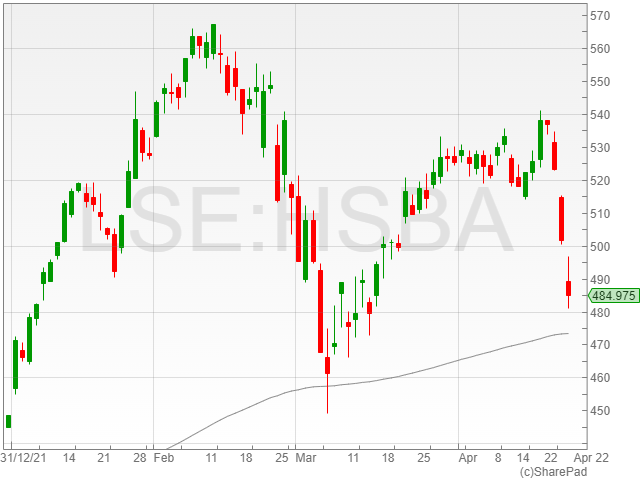HSBC shares were down 3.5% to 484p in early morning trading on Tuesday, following a post-tax profit fall of $1.1 billion to $3.4 billion and an adjusted pre-tax profit drop of $1.6 billion to $4.7 billion.
The company said its suboptimal results could be traced to a net charge for expected credit losses and additional credit impairment charges of $642 million.
“While profits were down on last year’s first quarter due to market impacts on Wealth revenue and a more normalised level of ECL, higher lending across all businesses and regions, and good business growth in personal banking, insurance and trade finance bode well for future quarters,” said HSBC CEO Noel Quinn.
“We have further reduced costs while maintaining high levels of technology investment, and remain on track to achieve our cost and RWA reduction targets for 2022.”

HSBC confirmed a reported revenue decline of 4% to $12.5 billion, in particular across its Wealth and Personal Banking sector.
The banking group also confirmed an adjusted revenue fall of 3% to $12.5 billion.
The firm attributed its sliding revenue to unfavourable market impacts in life insurance manufacturing and decreased investment distribution revenue in Hong Kong, with the addition of lower Global Debt Markets and Principal Investments revenue in Global Banking and Markets.
“As the first out the gate for the major UK-listed banks to report this week, HSBC’s results have been long awaited and seen as a bellwether for the global economy,” said Hargreaves Lansdown equity analyst Sophie Lund-Yates.
HSBC commented that net interest income increased across all global businesses on balance sheet growth and rising interest rates.
“Although the economic outlook remains uncertain, the continued upward path of interest rates since our full year results has further strengthened our confidence in delivering a double-digit return on average tangible equity in 2023,” said Quinn.
However, the war in Ukraine served to exacerbate inflationary pressures across the board, resulting in higher ECL charges in Q1 2022.
HSBC confirmed it expected ECL charges to normalise towards 30 basis points of average loans in 2022, projected on the back of current economic consensus forecasts and default experience.
The company said it expected mid-single-digit percentage revenue growth in 2022, with net interest income expected to rise on the back of implied market consensus policy rates improving since the financial group’s 2021 results, and supported by estimated mid-single-digit lending growth.
“The macro environment has been factored into a positive outlook for interest income, but the raising of interest rates is only one consideration. While this helps interest income rise, the wider global economic outlook is much harder to predict,” said Lund-Yates.
“The soaring inflation which these interest rate hikes are designed to address, makes the picture murky. Rumblings of recession chatter are being heard, and if this were to happen, all banks would feel the pinch.”
HSBC suffered a weakened capital position from regulatory changes and market conditions, as measured by the CET1 ratio, leading the firm to comment that future share buybacks in 2022 seemed unlikely.
“An HSBC-specific disappointment is the weaker capital position, which could see the conglomerate fall short of its own target range,” said Lund-Yates.
“This is being caused by a number of unhelpful headwinds, including regulatory changes and a steepening yield curve.”
“The main takeaway from this is that further buybacks are off the table for 2022. That will be a disappointment to banking investors, who may have become accustomed to the glut of buybacks from the sector in recent months.”
